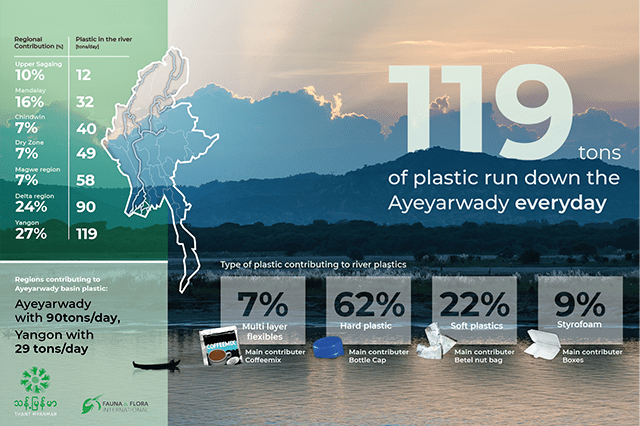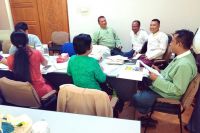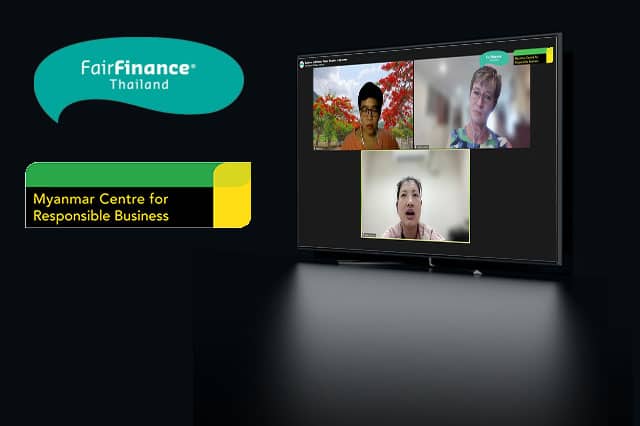Reducing Single-Use Plastic in Myanmar

MCRB joined Flora&Fauna International (FFI), Thant Myanmar and UNDP, with support from the German Embassy to organise a one-day workshop on 9 July at Hilton Hotel, Naypyidaw, to discuss how to reduce plastic pollution in Myanmar, with a focus on reducing single-use plastics, attended by around 70 government officials, members of Parliament, business and civil society organisations including environmental and consumer groups.
The workshop was opened by Dr Ye Myint Swe Deputy Minister of Natural Resources and Environmental Conservation (MONREC) who co-sponsored the workshop, which was funded by the German Embassy in Myanmar. He highlighted the need to clean up plastic pollution as it is both harming public health and wildlife and Myanmar’s natural beauty. U Min Maw, Director of Pollution Control, Environmental Conservation Dept, MONREC presented on the National Waste Management Strategy and Master Plan (2017-2030). May Thet Htwe of Thant Myanmar presented a guide to community solid waste management activities, noting that rural areas are in need of support from government and development partners to build systematic waste collection systems.
Friedor Jeske of Thant Myanmar presented initial findings of the new survey of plastic in the Ayeyarwady river basin, home to 60% of Myanmar’s population. This was undertaken in December 2018 and June 2019 with FFI, measuring plastic waste at five strategic points. It showed that an estimated 119 tons of plastic waste wash into the ocean every day from the mouths of the Ayeyarwady, primarily from the population in the deltaic area of Ayeyarwady Region, contributing an estimated 32 tons. Yangon is estimated to contribute 29 tons of plastic per day. The survey has received extensive media coverage.
Dr Htun Thwin presented the findings of a survey of marine micro-plastic pollution conducted by the Fridtjof Nansen research vessel in Aug-Sept 2018 and showed that Myanmar’s coastline is heavily impacted by micro plastics, particularly on the Rakhine coast which were mainly fragments of polyethylene (55%) and polypropylene (23%).
Participants were polled using Mentimeter on:
what should be prioritised to address plastic pollution in Myanmar: reducing use of single-use plastic (65%) or waste management (35%)
the most effective way to reduce use of plastic in Myanmar: awareness-raising campaigns (49%; taxing single use plastic (34%) or single-use plastic ban (17%)
who has the main responsibility for waste management: Government 51%); General public/civil society (43%);Private sector (6%)
Panel discussions included inputs from business (CityMart and Nestle) discussing different policy options and how stakeholders including business could work collectively to address the issue, and the role of government. Approaches in the region were presented including bans on single-use plastic; a fee/tax or deposit system; rebates for individuals bringing their own containers and fines for littering. Taxing producers and extended producer responsibility were also highlighted.
Deputy Director-General of ECD, U Sein Htoon Lin explained ASEAN perspectives and Hanna Helsingen of Thant Myanmar highlighted examples of government and civil society action internationally to reduce waste. Vicky Bowman, Director of MCRB presented on global and Myanmar efforts by business to reduce plastic usage, including multistakeholder Plastics Pacts initiate by the Ellen Macarthur Foundation in UK, France and Chile, as well as campaigns to collect and count types of waste and the brands which produce it, to hold companies accountable, such as the Brand Audit.
Participants in break-out groups discussed how usage of different plastic items including sachets, OET/HDPE bottles, plastic bags, Styrofoam boxes and straws could be reduced and the different awareness-raising and policy and legislative options which could be used.
Share:

 English
English မြန်မာ
မြန်မာ မြန်မာ (unicode)
မြန်မာ (unicode)









